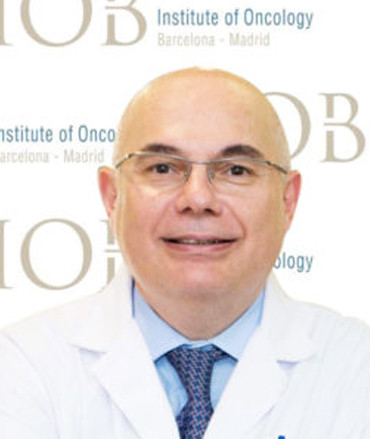- President of the European Society of Medical Oncology 2018-2019
- Medical Director, IOB Institute of Oncology
- Digestive and Endocrine Tumour Unit, IOB Institute of Oncology
- Director of the Vall d’Hebrón Institute of Oncology
He is a medical doctor and holds a PhD from the Autonomous University of Barcelona, Spain. He is currently Head of Department of Medical Oncology of the Vall d’Hebrón University Hospital in Barcelona and Director of the Vall d’Hebrón Institute of Oncology.
In addition to his passion for having a close relationship with his patients, Dr. Josep Tabernero has a very high scientific profile. He has been very involved in the investigation of many medicines for colorectal cancer, such as Aflibercept, Regorafenib Ramucirumab and TAS 102. Among these medicines, we highlight his contribution to the development of Cetuximab and Panitunumab, which have provided a great opportunity to KRAS wild type patients (40% -50% of colorectal patients).
He is heavily involved in transnational research and phase I pharmacodynamic studies with targeted molecular therapies. He is especially devoted to phase I and II studies with pharmacodynamic parameters with new agents, targeting membrane receptors, such as the EGFR and IGF-1R family, the PI3K and ERK signalling pathways, as well as cytoplasmic and intranuclear effectors such as Mdm2 / P53 and aurora kinase. Based on the idea that each tumour has an independent genetic identity, the group led by Dr. Tabernero participates in the development of molecular therapies targeted to specific oncoproteins, with the purpose of developing personalised therapies (for example, against EGFR, HER2, BRAF, MEK, PI3K, Akt, mTOR or IGF1-R among others) for patients that show genetic lesions or deregulation of the pathway. One of the main objectives of the group is to identify new predictive markers of response to various treatments and also to identify primary (de novo) and secondary resistance markers.
At a preclinical level, the target group is developing new models of xenografts with tumours from patient explants (“xenopatients”) in mice to mimic the patient’s disease and to study tumour development in optimised research models. He also leads a programme that studies circulating biomarkers (detection and genotyping of circulating free DNA).
He is a member of the Executive Board of the European Society of Medical Oncology (ESMO) and was Treasurer and President of the Audit Committee until 2015. He has been elected president of the ESMO 2018-2019 and is currently elected President. He is a member of the ESMO Clinical Benefits Scale Magnitude Working Group, the ESMO Public Policies Steering Committee and the ESMO Audit Committee.
He is also a member of the American Association for Cancer Research (AACR) and of the American Society of Clinical Oncology (ASCO), and participates in its International Affairs Committee. He is actively involved in different editorial boards such as the Journal of Clinical Oncology, clinical cancer research, cancer discovery, clinical colorectal cancer and ESMO Open.
He is co-author of approximately 250 peer-reviewed documents. He has also been a member of the educational and scientific committees of the meetings of the ESMO, ECCO, ASCO, AACR, AACR / NCI / EORTC, Gastrointestinal ASCO and WCGIC.

